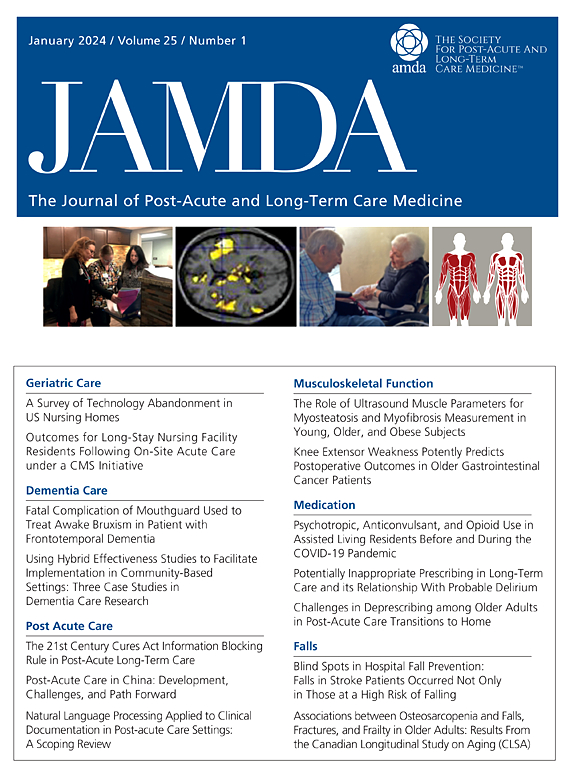Impact of Vitamin D Supplementation on Cognition in Adults With Mild to Moderate Vitamin D Deficiency: Outcomes From the VitaMIND Randomized Controlled Trial
IF 3.8
2区 医学
Q2 GERIATRICS & GERONTOLOGY
Journal of the American Medical Directors Association
Pub Date : 2025-06-24
DOI:10.1016/j.jamda.2025.105711
引用次数: 0
Abstract
Objectives
Preserved cognitive health with ageing is a public health imperative. Vitamin D deficiency is associated with poor cognition, but it is unclear whether supplementation would provide benefit, particularly in individuals with mild/moderate deficiencies which do not have other clinical risks. The objective of this study was to establish the impact of daily vitamin D supplementation on cognition in older adults with mild to moderate vitamin D deficiency.
Design
Two-arm, parallel, 24-month randomized controlled trial, with vitamin D supplementation compared with a placebo.
Setting and Participants
This was a remote trial, completed from home involving 620 adults, aged ≥ 50 years, with mild to moderate vitamin D deficiency and early cognitive impairment.
Methods
The primary outcome was executive function measured through Trail Making Test Part B and other secondary measures of cognition, function, and well-being.
Results
Vitamin D supplementation conferred no significant benefit to executive function compared with placebo at follow-up on the primary outcome (between-group difference, 5770; 95% CI, −2189 to 13,730) or cognition, function, or well-being. Secondary analyses in defined subgroups and a per-protocol analysis also showed no significant impact on any outcome measures.
Conclusions and Implications
Vitamin D supplementation produced no measurable improvement in cognitive outcomes in older adults with mild to moderate vitamin D deficiency. The remote trial methodology provides an innovative approach to large-scale trials.
补充维生素D对轻度至中度维生素D缺乏症成人认知能力的影响:来自维生素ind随机对照试验的结果
目标:随着年龄的增长保持认知健康是公共卫生的当务之急。维生素D缺乏与认知能力差有关,但目前尚不清楚补充维生素D是否有益,特别是对没有其他临床风险的轻度/中度维生素D缺乏的个体。本研究的目的是确定每日补充维生素D对轻度至中度维生素D缺乏症老年人认知能力的影响。设计:两组,平行,24个月的随机对照试验,将维生素D补充剂与安慰剂进行比较。环境和参与者:这是一项远程试验,涉及620名年龄≥50岁、轻度至中度维生素D缺乏症和早期认知障碍的成年人,从家中完成。方法:主要结果是执行功能,通过跟踪测试B部分和其他次要测量的认知,功能和幸福感。结果:在主要结局的随访中,与安慰剂相比,补充维生素D对执行功能没有显著的益处(组间差异,5770;95% CI, -2189至13730)或认知、功能或幸福感。在确定的亚组中进行的二次分析和按方案分析也显示对任何结果测量均无显著影响。结论和意义:补充维生素D对轻度至中度维生素D缺乏症的老年人的认知结果没有可测量的改善。远程试验方法为大规模试验提供了一种创新方法。
本文章由计算机程序翻译,如有差异,请以英文原文为准。
求助全文
约1分钟内获得全文
求助全文
来源期刊
CiteScore
11.10
自引率
6.60%
发文量
472
审稿时长
44 days
期刊介绍:
JAMDA, the official journal of AMDA - The Society for Post-Acute and Long-Term Care Medicine, is a leading peer-reviewed publication that offers practical information and research geared towards healthcare professionals in the post-acute and long-term care fields. It is also a valuable resource for policy-makers, organizational leaders, educators, and advocates.
The journal provides essential information for various healthcare professionals such as medical directors, attending physicians, nurses, consultant pharmacists, geriatric psychiatrists, nurse practitioners, physician assistants, physical and occupational therapists, social workers, and others involved in providing, overseeing, and promoting quality

 求助内容:
求助内容: 应助结果提醒方式:
应助结果提醒方式:


